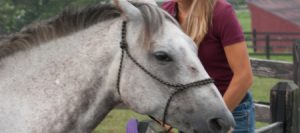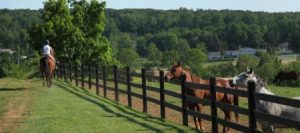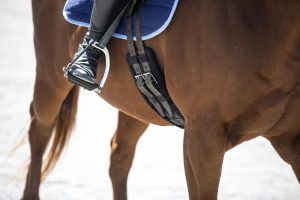Behavior can be both simple and complicated.
Today, let’s focus on the simple.
Understanding the behavior of your horse, what causes different behaviors, whether certain behaviors will continue, and how horses learn new behavior are all very important for your work with your horse.
The more that we can understand how behavior works, the more that we can help our horses understand what we need them to do, and also, we might be able to understand ourselves a little better too.
In this video, I’m going to teach something called the “ABC Model of Behavior”. It is a simple way to understand why your horse does what he does!
Hit play below to watch the video and then if you are interested in learning more about horse behavior and training, Click Here to Join the Balanced Riding Course Workshop.














24 Responses
I have a question. My percheron aurora doesn’t come to me when I go to her. I would normally just chat or pat her or talk. She is not the type that shows affection while I do. So sometimes she would turn away from me and I would feel rejected. How do I overcome this as I feel she should not be afraid to come towards me why only when there is a treat involved. How can I better understand her
Hi Nicolene, I totally understand what you mean! You are looking for a little more connection between the both of you! I would highly recommend checking out our Pure Liberty Course, although registration isn’t currently open I think it would be so beneficial for the situation you are describing! You can sign up for the notifications by clicking here.
– Julia Burdy, CRK Training Community Manager
My horse gets right behind me as I am leading him A
He tries to bite as B
I raise my lead rope as C
But he always tries !
Audrey, how do you think you could disrupt this behavior chain?
– Julia Burdy, CRK Training Community Manager
I inadvertently taught my horse a “pre-cue” cue that was meant for myself to prepare Me to transition from a walk to a trot, and that was quietly saying, “aaaaand…” before saying “trot!” The consequence is that he also prepares his body to transition when he hears that and immediately trots on the “trot” word cue!
Interesting. Have never seen this information before & it has really given me something to think about. Thank you for presenting it.
The horse that I am leasing is very mouthy and I have been working with him to stop this behavior. I have stopped giving him treats and have been doing ground work to teach him to stay out of my space. I also watched your video where you show how to move the horse away by holding the halter. I am using this method when leading him. The other day he was following me down the arena to get his pal out of his stall and he bit me on the back of my arm. It was more of a pinch but bruised my arm. I don’t get the sense that he is being aggressive, just playful. I think he sees me as a horse to play with. Do you have any other suggestions how to stop this behavior?
Stopping the treats is a good start. Until you are able to change the mouthy behaviour, keep yourself safe by insisting that the horse stay out of your space. That way he can’t get close enough to bite/nip/mouth you. We have had success with reducing biting behaviour by putting our fingers/thumb into the horses’s mouth anytime they try to bite and keeping the fingers there for 5-10 seconds. I don’t know why it works, but it certainly has helped.
Until you are able to change the mouthy behaviour, keep yourself safe by insisting that the horse stay out of your space. That way he can’t get close enough to bite/nip/mouth you. We have had success with reducing biting behaviour by putting our fingers/thumb into the horses’s mouth anytime they try to bite and keeping the fingers there for 5-10 seconds. I don’t know why it works, but it certainly has helped.
My cues for behavior are fairly common, saying “woo..” to slow, “trot” to trot. Also, slight half halt before using outside leg to cantor. He also senses when I shorten reins he is going to be asked to cantor and jump. I use my voice to reward during our lessons. Consequences for not being attentive include half halt and sometimes a tap on the shoulder with my crop. I’m responsible for carrots and apples after our rides and so he knows to nicely walk back to the stall and “back” up on verbal cue once in the stall to be polite/not aggressive to receive treats. Learned behavior and good consequences!
Hi Callie, one of my horses paws(scratch) with his front hooves when it is feeding time. He dug a mini mine at the gate and I put a rubber mat down, stopped the behaviour for a while and started doing the same next to the rubber mat! How do I change the behaviour please?
Hi Johann, we actually have a video specifically about pawing! You can click here to watch it!
– Julia Burdy, CRK Training Community Manager
I was feeding pieces of apple to a friends horse I help look after and realised that, if I gave him a piece each time he put his nose forward, i was effectively teaching him to mug me. So I started to give it to him each time he turned his head away from me. All it took was a few moments and he understood really well within the 8 pieces of that apple. I feel safer now and he seemed to enjoy the game.
Absolutely Wendy! I taught my horse to hold her head away if she wants a treat and now when she knows I have treats that is what she does!
– Julia Burdy, CRK Training Community Manager
I just bought my first horse six months go. Leased a horse for two years before..a very lazy ex polo pony. My horse now, canters off with me whenever I either give too much leg, or shorten reigns at the trot. He canters right through my half halts to stop. Help!
Jamie, I have a couple of videos that I think will be helpful for you to watch to help you get some ideas on how you can work through this!
Subtle Cues
What is a Cue
Let me know if these are helpful!
– Julia Burdy, CRK Training Community Manager
My horse won’t walk out if the barn. She walks in but walking back to pasture is a nightmare.
Evangeline, is there a particular reason that you find she doesn’t want to leave the barn? Are her buddies still inside? Does the change in footing from the barn to outside make her uncomfortable?
– Julia Burdy, CRK Training Community Manager
I have been working on standing still at the mounting block. I noticed that anytime I would gather the reins or touch his withers, this caused home to step away from the block. Once I stopped touching him in that area, I was able to mount up without him stepping away. Of course now I mount with no reins in hand at all and I don’t think this is safe but I will take my small victory and press on !!
Interesting Seana! I wonder if he has something bothering his mouth that could be causing him to react that way?
– Julia Burdy, CRK Training Community Manager
My horse has a very annoying habit of not wanting to leave the barn and walk out on the trail by himself. He just shuts down, stops and I can’t get him to move unless one of his busies goes first. He suddenly gets “thick skinned” and no amount of pressure seems to work. Help!
Hi Trish, have you used any positive reinforcement to work with him? Have you tried hand walking him out?
-Julia, CRK Training Community Manager
Yes, I decided to tack him up or not and walk him to the trail head making it nice and easy. I even let him graze on the way, although maybe that might not be the best habit for him to get into. He still stops sometimes but he’s easier to get going. Thank you
I am riding the training horse for few months already. One time lesson is good the other time bad. Last lesson he didn’t want to move at all. I sit on him and he is standing, not moving. I ask him to walk nothing, I ask him to trot nothing, I put legs pressure nothing, as per trainer I use a whip, nothing. Finally when she smacked him in the back he start moving, but stopped every time we were by a trainer. I am not sure what else to do to make him to listen to me. Looks to me that he only pays attention to the trainer, when she is not around he listen much better, but I don’t want lesson without her, as she teaching me right techniques. When I was walking him back to stable and stopped to open a gate he hit me with his head, I am not sure if he meant it or it was accident, as he was trying to chase flies away. What do you think I should do?
Hi Renata, if you aren’t comfortable riding him I would have a conversation with your instructor!
-Julia, CRK Training Community Manager